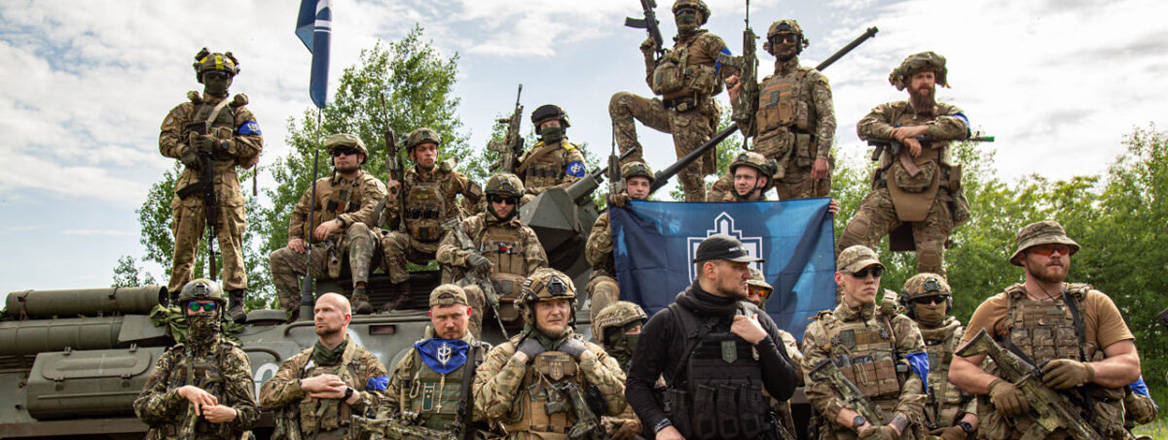A Tale of Two Cities: Russia’s Vulnerable South is Left to its Own Devices
While Russian forces have been bogged down in Bakhmut, the southern Russian region of Belgorod has struggled to repel attacks from across the Ukrainian border. What does this show about the Kremlin’s approach to its regions and how federal resources are being allocated?
As the much-anticipated Ukraine counteroffensive is unfolding, the movement of troops and hardware around the Donetsk-region town of Bakhmut has attracted much attention. While this frontline is important, for the Kremlin, the tussle over Bakhmut is unlikely to be the real focus or its key preoccupation. Indeed, there are signs within Russia – particularly in its southern city of Belgorod – that the spill-over of the war is beginning to have a more significant impact. The Kremlin’s management of the war in Belgorod reveals how its hands-off approach to regional government is becoming a strategic vulnerability in this war.
Russia’s Vulnerable Borders
Even before Ukraine’s counteroffensive started, there has been an abrupt escalation of the war in recent weeks, particularly on Russian territory. Attacks on Russia’s railway infrastructure, on bridges linking Russia and Crimea, and on Russia’s Druzhba pipeline and other refineries in Siberia – as well as the drone attacks in Moscow – have all indicated that the front line of the war around Bakhmut is not the only prize. Ukraine has not accepted responsibility for any of these incidents, but its administration has remarked on the attacks with clear approval. Either way, the attacks deeper into Russian territory indicate the scale of the parallel war taking place beyond the front line, in which both sides are demonstrating much riskier behaviour – making the war far more dangerous and unpredictable.
But it is the regional situation in southern Russia, on the border with Ukraine, which is something of a conundrum for the Kremlin. Belgorod is the first Russian region where the reality of war has been starkly driven home. It has experienced an uptick in violence in recent months, with shelling by the Ukrainian side, accidental friendly fire from the Russian armed forces, and anti-Kremlin groups conducting territorial incursions into Belgorod’s villages. Meanwhile, the beleaguered regional governor has abruptly found himself at the centre of prisoner-of-war negotiations that he is ill-equipped to deal with. All of these issues have suddenly put Belgorod at the centre of Russia’s war effort.
As anti-Kremlin insurgents entered Russian territory in early June, governor Vyacheslav Gladkov was forced to admit that the Belgorod authorities had temporarily lost control over the village of Novaya Tavolzhanka, a border village close to Ukraine. A proposed prisoner exchange failed, with conflicting messages as to whether Gladkov would agree to a sit-down negotiation with the insurgent group.
A Hands-Off Approach
But the Kremlin has expended very little central effort on assisting Belgorod, either militarily or financially. Gladkov is not a military man – he is a career diplomat, with a brief stint in agricultural holdings. He is also relatively new to the region, only taking up his post in 2021 and lacking the regional patronage networks required to get things done at a local level. But he has complained lightly about the lack of money the Kremlin is sending for Belgorod’s reconstruction after the shelling, with the region mostly left to its own devices.
Kremlin has expended very little central effort on assisting Belgorod, either militarily or financially
It has been estimated that the cost of reconstruction of Belgorod’s city of Shebekino, which has been repeatedly shelled in recent months, would be around 13 billion rubles. But regional budgets have already been allocated, with 10 billion rubles spent on border fortification by February – plans that had been in place since April 2022. The annexed territories of Ukraine are another drain on Russia’s finances – Russia is funnelling billions into the four occupied regions, which have already received almost $185 billion from Russia’s federal budget for ‘reconstruction’. But the imposition of martial law in the annexed territories means that things like tight budget restrictions are suspended, and their financing is approved annually rather than every three years. All of this means that there is little left over for Belgorod to absorb, even though its own regional expenditure grew by 48.4% in the first quarter of 2023 to meet the demand for civilian defence. In previous years Belgorod has demanded very little from the federal budget, and so this increase does not reflect a particularly significant injection of resources from the Kremlin.
The annexed territories of Ukraine are another drain on Russia’s finances
To protect the border, over the past few months, civilians from Belgorod have been hired to help with digging trenches and fortifications around the region, with many reporting poor working conditions and non-payment of salaries. The security line that civilians have constructed consists of relatively unsophisticated dragon’s teeth (anti-tank defences) accompanied by barbed wire – low-tech solutions that have already proven easy to dismantle. And while these obstacles may temporarily slow down any kind of territorial incursion into Belgorod, they provide little defence against drones and air attacks, the main threat in the region. The border with Ukraine is long and the fortifications are unmanned, making them even more vulnerable.
In perhaps a reflection of the Kremlin’s priorities, while air defences do operate in Belgorod, no extra military reinforcements have been sent there; National Guard have not been deployed to support Gladkov, nor have there been any serious efforts to reduce civilian casualties by relocating military assets within Russia away from populated areas – all of which would reduce the risk for the local population. It is only recently that some people have been evacuated from border villages.
There also do not appear to have been any specific steps taken to counter the threat from the anti-Kremlin groups that have already successfully penetrated Russia – no fences have been installed, and there are no FSB or military patrols to ensure that the insurgents remain over the border in Ukraine. Gladkov has also come under pressure from Yevgeny Prigozhin, leader of the Wagner group, who maintains that there is insufficient organisation or training in the Belgorod region to deal with the security threat. While this could be more about Prigozhin’s interests in furthering his own political career in Russia’s regions, it also highlights the limits of Gladkov’s abilities, as security assistance and training from the federal centre has not been forthcoming.
Another interlinked aspect to all this is Gladkov’s own interests. Should he serve Putin well in this war and prove able to prevent the situation from spilling over more deeply into Russia, he could be well rewarded. He reportedly spoke to Putin personally a few days ago by phone to discuss the situation in Belgorod, an unusual opportunity to communicate directly with the president and those controlling the war. Gaining the attention of the presidential administration will be vital if he is to further his own career.
For now, these armed anti-Kremlin groups appear to be fringe and isolated incidents, but should this change, Gladkov and his team are ill-equipped to deal with a more sophisticated ground incursion.
The views expressed in this Commentary are the author’s, and do not represent those of RUSI or any other institution.
Have an idea for a Commentary you’d like to write for us? Send a short pitch to commentaries@rusi.org and we’ll get back to you if it fits into our research interests. Full guidelines for contributors can be found here.
WRITTEN BY
Emily Ferris
RUSI Senior Associate Fellow, International Security
- Jim McLeanMedia Relations Manager+44 (0)7917 373 069JimMc@rusi.org


